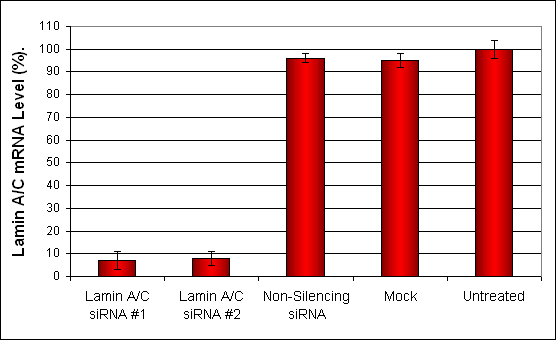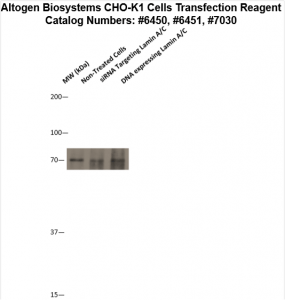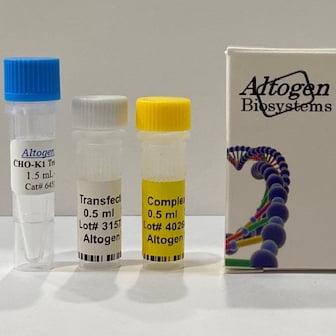Description
Purchase Orders: Click “Add to Cart” button to order, then email PO to orders@altogen.com.
Product Availability: In Stock.
Transfection Reagent for CHO-K1 Cells (Ovarian Adenocarcinoma Cells, CRL-9618)
- A liposome-based lipid formulation
-
Transfection Enhancer reagent provided with the kit
-
Produce higher level of recombinant protein expression with minimal disruption of normal cell function
-
Generate physiologically relevant data you can trust
-
Effective for plasmid DNA/siRNA co-transfection
-
Easy-to-use transfection protocol with reproducible results
-
Low cytotoxicity
-
Download in vitro CHO-K1 transfection protocol: [PDF]
- Download CHO-K1 CRISPR/Cas9 transfection protocol: [PDF]
- Download PowerPoint presentation for CHO-K1 cells transfection kit: [PPT]
- UPC/GTIN/EAN: 860002089744
-
Brand: ALTOGEN®, developed and manufactured by Altogen Biosystems
Transfection Efficiency:
Reagent exhibits at least 92% transfection efficiency of siRNA delivery. Transfection efficiency was determined by qRT-PCR.
Transfection Protocol and MSDS:
Download Altogen Biosystems CHO-K1 Transfection Protocol: [PDF]
Download MSDS: [PDF]
CHO-K1 Cell Line:
Hamsters, like mice, make for good research models, and the Chinese Hamster Ovary (CHO) cell line has long been used in the investigation of new drugs. The CHO-K1 cell line is isolated from a subclone of the CHO cell line that was derived from ovary cells of an adult Chinese hamster (cricetulus griseus) in 1957. The cells from the CHO-K1 cell line are resistant to a number of viruses, including poliovirus 2, Button Willow virus, and Modoc virus. Also, CHO-K1 cells are especially useful for the synthesis of therapeutic proteins in addition to the role they play in medical and biochemical research. This cell line requires the presence of proline for growth but makes for a good transfection host. These cells are invaluable in a variety of biomedical research applications related to molecular and cell biology. Altogen Biosystems designs an advanced formulation of a liposome-based lipid CHO-K1 transfection reagent for the CHO-K1 cell line, which has exhibited ~92% transfection efficiency and low cytotoxicity.
CHO-K1 (Chinese Hamster Ovary-K1) cells are a commonly used cell line in biotechnology and biomedical research. They are derived from the ovary of the Chinese hamster and are widely used for the production of recombinant proteins and biopharmaceuticals. CHOK1 cells have several advantages as a host cell for the production of recombinant proteins. They are able to correctly fold and process complex proteins, and they are able to perform post-translational modifications such as glycosylation. CHO-K1 cells also have a high growth rate, are able to grow in suspension culture, and are adaptable to various serum-free media. The CHO-K1 cell line is a valuable tool in biotechnology and biomedical research, and its widespread use has contributed to many advances in the field.
Data:

Figure 1. siRNAs targeting Lamin A/C mRNA or non-silencing control siRNA were transfected into CHO-K1 cells following the recommended protocol. At 48 hours post-transfection the cells were analyzed by qRT-PCR for Lamin A/C gene expression levels. 18S rRNA levels were used to normalize the Lamin A/C data. Values are normalized to untreated sample. Data are means ± SD (n=4).

Figure 2. Protein expression of Lamin A/C in CHO-K1 cells. DNA plasmid expressing Lamin A/C or siRNA targeting Lamin A/C were transfected into CHO-K1 cells following Altogen Biosystems transfection protocol. At 72 hours post-transfection the cells were analyzed by Western Blot for protein expression levels (normalized by total protein, 10 µg of total protein loaded per each well). Untreated cells used as a negative control.
Altogen Biosystems:
Altogen Biosystems provides optimized transfection products for life science research applications. Transfection protocols are optimized for individual cancer cell lines. Altogen Biosystems developed two types of in vivo delivery kits for animal research: Tissue-targeted reagents (delivery to liver, pancreas, and kidney tissues), and broad range in vivo delivery reagents (PEG-Liposome, Nanoparticle-based, Lipid-based, and Polymer-based kits). Advanced formulation of reagents and optimized transfection protocols provide efficient intracellular delivery of proteins, DNA, RNA, and any other negatively charged molecules in vitro and in vivo. Read more about transfection technology at Altogen’s Transfection Resource.
Altogen Labs Contract Research Services:
Altogen Labs provides GLP-compliant contract research studies for preclinical research, IND applications, and drug development. Biology CRO services include: Xenograft models (90+), development of stable cell lines, ELISA assay development, cell-based and tissue targeted RNAi studies, safety pharm/tox assays, and other studies (visit AltogenLabs.com).
Volume Options:
- 0.5 ml (Catalog #6450)
- 1.5 ml (Catalog #6451)
- 1.5 ml CRISPR (Catalog #2129)
- 8.0 ml (Catalog #7030)
Purchase Orders: Click “Add to Cart” button to order, then email PO to orders@altogen.com.
Product Availability: In Stock.





